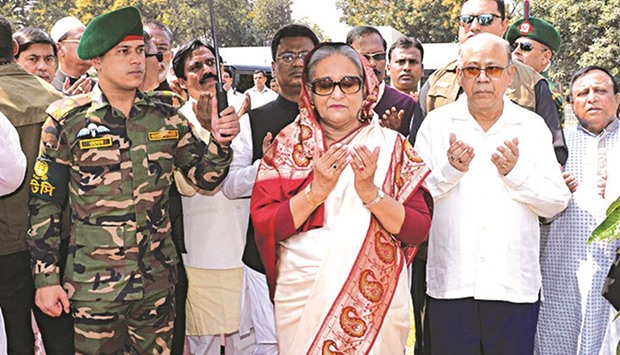Bangladeshi Prime Minister Sheikh Hasina inaugurated yesterday the country’s first solar-powered food warehouse with a capacity of 25,000 tonnes of grain in the northern part of the country.
The modernised, multi-storey warehouse was built with financial and technical support from Japan.
Food silos are crucial for natural disaster-prone Bangladesh to keep stocks safe from water and other threats.
The world’s fourth-biggest producer of rice, Bangladesh uses almost all of its production to feed its population of 160mn, and often needs imports to cope with shortages caused by natural calamities such as floods or droughts.
Bangladesh imports around 4.5mn tonnes of wheat a year to meet growing demand, while the country’s output has stagnated at about 1mn tonnes.
“By 2021, the food storage capacity is expected to grow up to 100%,” she said, adding that the newly-built warehouse would increase the storage capacity of government facilities in the
Rajshahi region.
The prime minister also planted a mango sapling on the Santahar warehouse premises.
The premier later in the day attended a mammoth rally at Shantahar Stadium, organised by Adamdighi Upazila Awami League.
She urged the people to support the Awami League to continue the country’s peace, progress and development, saying that all development activities would be halted if any other party or alliance came to power.
Illustrating her government’s various steps for development, the PM said that her government had embarked on a mega plan to set up 100 economic zones across the country for industrialisation and for generating employment in the country.
She mentioned that her government had slashed down poverty rate to 22%. “Our target is to cut the rate to 15%. We want not a single person to remain poor and homeless.”
Meanwhile, a senior government official has said that Bangladesh aims to raise its annual bilateral trade with Canada to $5bn by 2022 from the
current $2bn.
Bangladesh is the second-largest importer of Canadian foodgrains and other agricultural products in South Asia. Since January 2003, Canada has allowed duty-free access to Bangladeshi products, in particular ready-made garments. Clothing accounts for 96% of Bangladesh’s exports to
Canada.
“We are confident to increase our bilateral trade volume by more than double from the present level over the next five years,” Shahriar Alam, junior minister for foreign affairs, told a conference.
Alam urged Canadian entrepreneurs to take advantage of the liberal investment-friendly atmosphere of Bangladesh.
“Their investment in the Special Economic Zones of Bangladesh in the areas of power, energy and transportation sectors, food and agro processing, IT and telecommunications, light engineering, shipbuilding, services and hospitality sectors will contribute to the economic development of both countries.”
Canadian High Commissioner Benoît-Pierre Laramée said the Canadian government wanted to work with Bangladesh, especially on environmental and climate change issues and also gender equality and the health sector.

Bangladesh Prime Minister Sheikh Hasina offers prayers before inaugurating a solar-powered food warehouse in Rajshahi yesterday.
